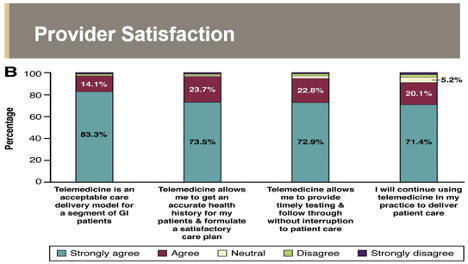A new report by a team of gastroenterology (GI) providers is citing that since the COVID-19 pandemic began, telehealth encounters are proving to be a highly effective option among GI providers and patients.
The report, “Gastroenterologists and Patients Report High Satisfaction Rates With Telehealth Services During the Novel Coronavirus 2019 Pandemic,” is based on two studies:
- A survey of GI patients’ satisfaction with telehealth during the COVID-19 pandemic. The survey reflects responses from 1,492 patients with community-based GI practices in Michigan and the Washington, DC, region, who participated in a telehealth visit from March to May 2020.
- A provider-based opinion survey was distributed to members of the Digestive Health Physicians Association (DHPA). The survey received responses from 503 providers in 71 independent GI practices nationwide.
“We never before had nationwide studies conducted on the effective use of telehealth within gastroenterology. These findings underscore the fact that telehealth is a highly effective modality in delivering GI care,” said Naresh T. Gunaratnam, M.D., AGAF, CEO of Huron Gastro, which participated in the surveys, and an author of the findings report.
Among GI patients, the survey showed that greater than 80% of patients responded that their provider addressed their GI concern during the telehealth visit, and they were willing to participate in more telehealth visits in the future.
High satisfaction was observed in all age groups, with the highest rates in patients older than age 85. This widespread acceptance of telehealth, especially among the most senior populations who are traditionally less tech-savvy, points to the efficacy, ease, and functionality of telehealth technologies, including patient engagement platforms, patient intake solutions, and mobile apps, including those offered through Curago Health.
Among symptom-related visits, patients responded highly that their provider was able to address them through telehealth. Among the most common reasons for telehealth visits, satisfaction ratings included:
- Nausea/Vomiting: 95.7%
- Heartburn/GERD: 91.9%
- Procedure-related (prep and follow-up): 91.9%
- Diarrhea: 89.3%
- Inflammatory Bowel Disease: 89.2%
- Abdominal Pain: 89.0%
Among GI providers, greater than 90% agreed or strongly agreed to all four prompts:
- Telemedicine is an acceptable care delivery model for a segment of GI patients (83%)
- Telemedicine allows for accurate health history and formulates a satisfactory care plan (74%)
- Telemedicine allows for timely testing and follow-though without interruption to patient care (73%)
- I will continue using telemedicine in my practice to deliver patient care (71%)

“Modern medicine had evolved from the 1960s when a GI diagnosis had to be made in-person,” adds Dr. Gunaratnam. “Today, high-quality testing such as ultrasounds, blood tests, and scans can effectively diagnose GI symptoms without a provider needing to physically touch or examine a patient. This study points to the efficacy of telehealth in treating acute and chronic GI conditions during any disruption of our health care system.”